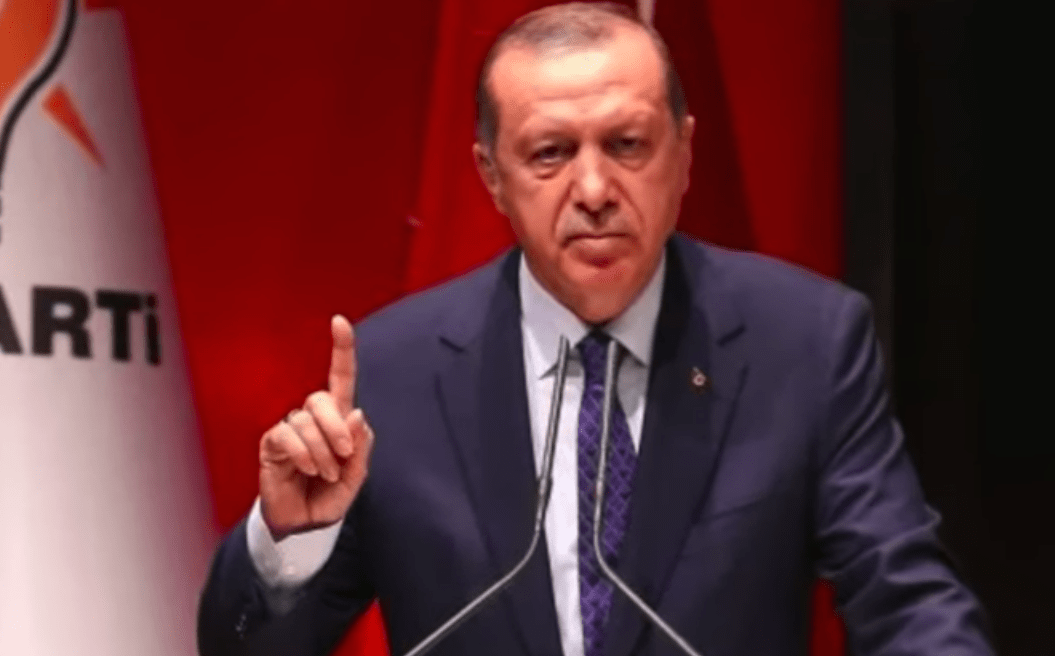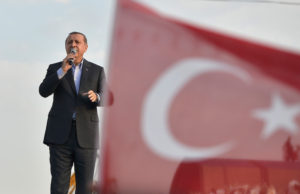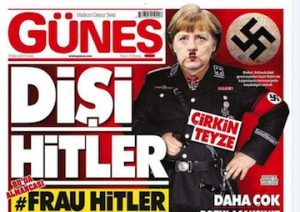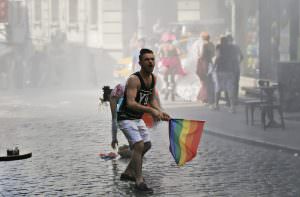Erdogan Finally Loses His Grip on Turkey
The Turkish president forced new elections after his party lost in March. Now, the governing party loses control of the country's big cities. Screen shot / YouTube
Screen shot / YouTube
President Erdogan had forced new elections after his party lost in March and now the governing party lost control of all Turkey’s major cities. Watch Baris Karaagac discuss Ekrem Imamoglu’s victory in Istanbul’s mayoral election in the following clip. You can also read the transcript below the video player.
MARC STEINER Welcome to The Real News Network. I’m Marc Steiner. It’s great to have you all with us. As many of us know, last March, Turkey’s President Erdogan nullified the election results for the Istanbul mayoral election after his party, the AKP, lost to the opposition. Now, Erdogan said there was election fraud in a razor-thin majority held by the opposition. Well a few days ago, a second election was held. The opposition led by Ekrem Imamoglu— I hope I said that right— won by a landslide. The opposition was formed by an amalgam of parties that span the spectrum— from his party, which was the founding party of Turkey, to the very nationalist Good Party and the pro-Kurdish People’s Democratic Party. And—Which was a difficult coalition to put together, but they did. And many of Erdogan’s AKP members also voted for Imamoglu according to some of the polls that were taken, despite the president’s panicked accusations that the other candidate was associated with terrorists. The horse race is one thing, but this election has clearly weakened the growing authoritarian government of the AKP and Erdogan, or has it?
The people of Turkey, especially in the urban areas, are fighting for their democracy. The Turkish economy— weakened by debt and spending and all the contradictions that capitalism has to offer. So what might the future of Erdogan be? Is it shaken as many of the headlines are saying, but he’s still fully in power? We are joined today by Baris Karaagac, who is a lecturer in International Development Studies at Trent University in Toronto. Baris, welcome. Great to have you with us.
BARIS KARAAGAC Thanks for having me.
MARC STEINER So let’s talk a bit about what just happened here, just politically. The cities seem, despite the national action that was held before where Erdogan won 54% of the vote or 52% the vote—In this last election in Istanbul, the opposition came together and won. They won in Ankara. So talk about what that political dynamic is. Is it similar or different from the dynamic we have in the United States with urban rules? Talk a bit about what that means.
BARIS KARAAGAC Well, first of all, let me give you some information about the significance of this election.
MARC STEINER Please.
BARIS KARAAGAC So the local elections that are held every five years in Turkey took place on March 31st and these elections in themselves are quite important because the opposition’s national alliance won five of the six major cities in Turkey. That was already an important defeat for the AKP and Erdogan and his alliance with the ultra-nationalist MHP, the People’s Alliance. Then in Istanbul, due to the rejection coming from the AKP, the Supreme Electoral Council annulled the election of the mayor in Istanbul. Ekrem Imamoglu who won the election of two days ago, actually won on March 31st, but only with 13,000 votes. And the difference between him and Binali Yildirim who was AKP’s candidate in both elections, was only 0.17% of the vote. Then, as I said, the Supreme Electoral Council decided to annul the election, the mayoral election. In my opinion and in the formal opinion of many actually impartial people, they were quite baseless allegations, claims directed at the opposition. Upon this annulment, another election only for the mayor of Istanbul was held on June 23rd. This time, Ekrem Imamoglu who had beaten his opponents only two and a half months ago with 13,000 votes, this time beat him with more than 800,000 votes.
MARC STEINER It was amazing. Yes, yes.
BARIS KARAAGAC There was a significant difference and I think the reaction of the voters played very important in this unfortunate result for the AKP and a victorious result for the opposition.
MARC STEINER So I mean, but why do you think Imamoglu and his coalition won with such a huge margin? What were the factors? I mean, A— I’m curious for our viewers, A— what the politics of this was and why they won so significantly given how that last national election turned out where AKP took a majority of the seats in parliament? So what’s the dynamic here? What has happened?
BARIS KARAAGAC I think a number of factors played a role there. First of all, many voters did not believe the allegations directed at the opposition. The AKP claimed after the March local elections in Istanbul, that there were a number of irregularities and later voter theft that led to their defeat, but they were able to present no credible, no legitimate evidence to back up their claims and the voters found it difficult to believe that there was actually irregularity or fraud or voter theft that might have affected the outcome of the election. That’s one thing. Secondly, during the campaign, we see discourse coming from the AKP and the MHP, which constituted the People’s Alliance, that further polarized the voters. Here we’re dealing with a country, we’re talking about a country that has been suffering from such discourse for such a long time, but particularly in the last five or six years. Everyday people wake up, they turn on their TV, and there’s a president, a prime minister earlier who constantly yells, chastises fools and others, the people who disagree with him. That has been an ongoing process and I think people are really tired of this. Thirdly, before the March elections especially, the AKP used a very nationalistic discourse, which they tried to modify after the March local elections. But especially, many Kurdish voters did not buy this and as a reaction, even conservative Kurds who have historically voted for the AKP seemed to have voted for the opposition this time, and there you see the difference of more than 800,000 votes.
MARC STEINER There’s a newspaper in Turkey called Karar, which was started by people who used to be in the AKP and allied with Erdogan, and their headline was “Earthquake at the Ballot Box.” And then, you see these photos of what looks like tens of thousands, if not hundreds of thousands, of people in the streets celebrating this victory in Istanbul, celebrating this in other cities as well when this happened. So I mean, what do you think is the political fallout here? Before we talk about some of the broader international issues this could affect, with a meeting coming up with Trump and Erdogan himself in next few days, what—I’m just curious what you see of this dynamic because Turkey seems to me, from what I’ve been reading, even though it has some universal opinions they may agree upon, which we can talk about if we have time, is really split. I mean, they’re really divided as a nation. So talk about, what does this mean for the political future?
BARIS KARAAGAC First of all it’s, I think, important to underline the fact that this is Erdogan’s greatest electoral defeat. You know, here is a politician who’s been winning elections since 1994— first as mayor of Istanbul. He became Mayor of Istanbul in 1994. Then in 2003, he became prime minister. After that, he became president, and he has been winning elections. It will not be an exaggeration to say that he is the most popular and powerful leader of our republican history in terms of the support he has gathered during his political career. And this is a significant defeat for him. There’s no question about it and the celebrations were actually a reflection of that. For many years, especially in the last five or six years when Turkey entered the very authoritarian difficult path, many people have lost, almost lost hope. Many people came to the conclusion that it would be difficult to defeat this person through the ballots. Even if he lost an election, he would not give up, so there was to some extent despair.
But this election, again, gave those people a lot of hope. You saw all these spontaneous celebrations in the streets, celebrations which were joined by different segments of the population. You saw secular social democrats, you see some nationalists who were tired of the support given by the MHP to Erdogan, you see Kurds, you see people and groups from different parts of Turkey and different parts of the political spectrum. However, as opposed to some overly optimistic analysis, I do not think that this is the beginning of the end for Tayyip Erdogan. There’s still a party, and a party that is centered around a political leader— i.e. Erdogan— who has more than 40% of the popular vote, so this is something important to keep in mind. And secondly, we do not know how Erdogan will actually respond to this electoral defeat. Right after the election on Twitter, he congratulated Ekrem Imamoglu on his win, but since then, he’s been rather quiet. Now his focus is on the G20 Summit that will be held in Osaka on the 28th and 29th of June, and Erdogan will be facing some challenges there.
MARC STEINER So let’s talk a bit about that. I’m curious how you think this is going to play out politically. There is a Center for American Progress poll that showed that the vast majority of Turkish people don’t like the United States, maybe like Russia a little bit better but aren’t that fond of Russia either, and were really evenly split on what the response to the coup was by Erdogan. But now, how may this play out when Erdogan is going to meet with Trump in Osaka over the F-35 sales of jets, as well as the missiles that Turkey’s buying from Russia, which is causing a huge issue between the United States and Turkey. So how do these things mesh up? I mean, this to me seems to make, kind of, a very complex political moment.
BARIS KARAAGAC For our international viewers, maybe I should give some background as to the most recent occurrences of US and Turkish relations. Those relations are quite strained actually. That started in 2013 but right now, there is significant tension between the United States and the Turkish state over the S-400 missiles, or an anti-aircraft missile system that Turkey has decided to buy from Russia. And in response to this, the US is threatening with kicking Turkey out of the F-35 program, and this is a ridiculously expensive aircraft program which Turkey has been a part of. Turkey has been producing some parts of these jet fighters. So. So far, in the past decade or more than a decade, after each electoral victory, Erdogan would see foreign leaders and with that strengthened hand in his negotiations. But this time, his summit meeting with Trump and Osaka would be a much more difficult one because the electoral defeat a couple of days ago has actually weakened Erdogan’s leverage, Erdogan’s hand, so he doesn’t have a very strong bargaining chip there. On the other hand, yesterday the Minister of Foreign Affairs said that Turkey is determined to buy the S-400 anti-aircraft missile system from Russia. However, I think the final decision will be made after Erdogan meets with Trump in a couple of days.
MARC STEINER So, before we close, if you were a betting man, where do you think this is going to go? [both laugh]
BARIS KARAAGAC You know, it is difficult to predict now because the two people, these two leaders are quite pragmatic leaders. Although, this issue has become part of a nationalist discourse in Turkey with the AKP officials arguing that Turkey is not dependent on any superpower, that it will preserve its independent foreign policy regardless of the pressure and the threats coming from the US, and so on and so forth. We still don’t know. Now, Erdogan is a little bit weaker vis-a-vis Trump because of the mayoral election in Istanbul.
MARC STEINER Though they are both very much alike. [laughs]
BARIS KARAAGAC [laughs] You know, there are many similarities between those two. Yes.
MARC STEINER Baris Karaagac, it’s been wonderful talk to you. Thank you so much for joining us today. We look forward to hopefully getting back to you once we see what these two men talk about in Osaka. Thanks for joining us today.
BARIS KARAAGAC Thank you so much for having me.
MARC STEINER It’s been my pleasure. And I’m Marc Steiner here for The Real News Network. Thank you all for joining us. Take care.
Your support matters…Independent journalism is under threat and overshadowed by heavily funded mainstream media.
You can help level the playing field. Become a member.
Your tax-deductible contribution keeps us digging beneath the headlines to give you thought-provoking, investigative reporting and analysis that unearths what's really happening- without compromise.
Give today to support our courageous, independent journalists.




You need to be a supporter to comment.
There are currently no responses to this article.
Be the first to respond.